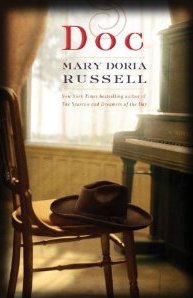In Mary Doria Russell’s latest novel, DOC, she seamlessly blends fact with fiction to recreate one of the most infamous gunfights in history, and to redefine two major icons of the American West: Doc Holliday and Wyatt Earp. Such a feat may not have been possible without the influence of her strong father, who not only taught her to shoot, but instilled in Mary the confidence necessary to pursue her dreams.
Photo: Mary on a horse, taken by Kari Burkey
 © Kari Burkey.jpg) When I began researching the life of Wyatt Earp, I knew almost immediately that I would be able to present Wyatt fairly and compassionately in my novel, DOC. You see, I actually believe in honest cops. I'm realistic, but not cynical about that.
When I began researching the life of Wyatt Earp, I knew almost immediately that I would be able to present Wyatt fairly and compassionately in my novel, DOC. You see, I actually believe in honest cops. I'm realistic, but not cynical about that.I'm a cop's daughter. Among other things, my dad was a Marine MP during the occupation of Japan. In civilian life, he was a town constable, a uniformed patrolman, a plain clothes detective, and an undercover narcotics officer. He capped his law enforcement career with five terms as the Sheriff of DuPage County, just west of Chicago. Police work was dinner table conversation in our house. I understand the tedium and the crappy pay and shift work, and the constant threat of danger. I am familiar with the way cops divide the world into three categories: Cops, Citizens, and Idiots.
To my father's continuing astonishment and chagrin, I was evidently born a Democrat, but I grew up with guns and that experience has influenced me in unpredictable ways. One of my earliest memories is my father taking me out into a stubbly cornfield in November. I must have been about four. He knelt down behind me and put the shotgun to his own shoulder, but showed me how to sight the gun and squeeeeeze the trigger. I don't remember being frightened by the bang. I just remember his body cradling mine, and the sense that if my dad said something was okay, I was safe.
 By the time I was 13, in 1963, I was spending Saturdays with Dad at the police range: firing off a box of cartridges with a bunch of macho guys who were impressed that I could “qualify” with a .357 magnum, a handgun that weighed almost as much as I did. In the 1970s, when the women's movement for equal rights was picking up steam, I was already comfortable with men; it felt natural to compete with guys and to win sometimes. I expected to earn their respect and to enjoy their camaraderie.
By the time I was 13, in 1963, I was spending Saturdays with Dad at the police range: firing off a box of cartridges with a bunch of macho guys who were impressed that I could “qualify” with a .357 magnum, a handgun that weighed almost as much as I did. In the 1970s, when the women's movement for equal rights was picking up steam, I was already comfortable with men; it felt natural to compete with guys and to win sometimes. I expected to earn their respect and to enjoy their camaraderie. As my dad himself could testify, I take crap from nobody, but I try not to ascribe to malice and sexism what is really rooted in cluelessness that can be corrected gently but firmly. My father instilled in me the confidence and sheer nerve that it took to decide that I could write DOC and, in doing so, redefine two iconic figures of the American West: Wyatt Earp and Doc Holliday. More importantly, my childhood experience of my father's respect, interest and support laid the foundation for 40 years of marriage (in a row, to the same guy), for 25 years of mothering a fine son, and 20 years of writing novels with a variety of realistic male characters.
So far, so good. Thanks, Dad.

